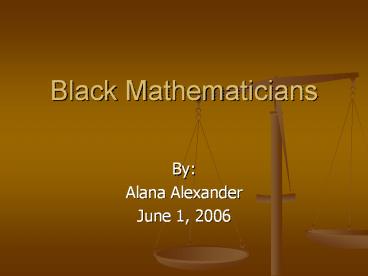Black Mathematicians PowerPoint PPT Presentation
1 / 22
Title: Black Mathematicians
1
Black Mathematicians
- By
- Alana Alexander
- June 1, 2006
2
Purpose for Students
- The purpose of this presentation is to recognize
the black mathematicians that achieved great
achievements in mathematics during a time when
blacks were looked at as inferior. - Young black students as well as all students need
to know that even tough mathematics is looked at
as a tough subject it can be achieved with great
perseverance.
3
Purpose for Teachers
- The purpose of this presentation is to make
teachers aware of great black mathematicians. - Teachers can use this information to help their
students, especially minority students relate to
mathematics and find encouragement from those who
persevered in mathematics.
4
Introduction
- There were many successful black mathematicians
who went through great difficulty in trying to
attain self-confidence in mathematics. - Most of the people in this presentation are
professional people who have earned degrees in
mathematics and have taught mathematics to other
mathematicians. - This is a remarkable achievement for people who
did not have all the rights and freedoms as other
groups of people.
5
Introduction
- The history of blacks in mathematics dates back
to the 1700s. - The first recognized black mathematician
recognized was a male. - It was almost 200 years before women appeared in
mathematics.
6
Benjamin Banneker
- Benjamin Banneker was the first Black recognized
as a mathematician. - He had little formal education.
- He displayed great talent in mathematics.
- He produced an almanac and was commissioned to
survey Washington D.C..
7
Thomas Fuller
- It has been said that he is the first known
mathematician. - Fuller was a slave shipped from Africa.
- Like Banneker, Fuller had no formal education.
- He possessed remarkable powers of calculations.
- He acquired these great mathematical abilities
from Africa.
8
Kelly Miller
- The first Black mathematics graduate student in
1887. - The first African American student admitted to
John Hopkins mathematics program. - He received a Master of Arts in Mathematics in
1901. - He continued his work in mathematics by being a
professor of mathematics and sociology.
9
Elbert F. Cox
- He showed great abilities in mathematics and
physics in high school. - The first African American to earn a Ph.D. in
Mathematics in 1925 from Cornell University. - There were only 28 Ph.D.s that were given in
1925 all over the country. - Cox s achievement of a Ph. D. in mathematics was
remarkable.
10
Dudley Weldon WoodardandWilliam Schieffelin
Claytor
- Woodard (1928) and Claytor (1933) were the second
and third black men to earn a Ph.D. in
Mathematics.
11
Dr. Dudley Woodard
- Dr. Woodard established the M.S. degree program
in mathematics at Howard University. - He helped to establish a mathematics library at
Howard University. - Woodard taught many of the upcoming black
mathematicians to come.
12
William Claytor
- William Waldron Schieffelin Claytor earned his
A.B. and M.A. from Howard University under
Woodard. - Dr. Claytor was the first African American to
publish mathematics research.
13
African American Women of Mathematics
- It wasnt until 1943 that a woman earned a Ph.D.
in mathematics.
14
Euphemia Lofton Haynes
- She became the first African American Woman to
earn a Ph.D. in Mathematics. - She taught in the public schools of Washington,
DC for forty-seven years. - She was the first woman to chair the DC School
Board. - Dr. Haynes established the mathematics department
at Miners Teacher's College.
15
African American Women (contd)
- There were many women to follow in Dr. Hayes foot
steps - Evelyn Boyd Granville
- Marjorie Lee Browne
16
Evelyn Boyd Granville
- The second woman to earn a Ph.D. in Mathematics.
- She earned her Ph.D. from Yale University in
1949. - Evelyn Granville first worked as a mathematician
with The National Bureau of Standards and IBM. - She became an Assistant Professor of Mathematics
at California State University. - She taught prospective elementary school teachers
new math.
17
Marjorie Lee Browne
- The third woman to receive a Ph.D. in
mathematics. - This was just six months after Evelyn Boyd
Granville. - Marjorie Lee Browne received her B.S. in
Mathematics from Howard University(1935). - She received her M.S. in Mathematics from the
University of Michigan in 1939. - She received a Ph.D. in Mathematics from the
University of Michigan (1950).
18
Marjorie Lee Browne (contd)
- She authored four notes for secondary school
teachers - Sets, Logic, and Mathematical Thought (1957)
- Introduction to Linear Algebra (1959)
- Elementary Matrix Algebra (1969)
- Algebraic Structures (1974)
19
Conclusion
- There were many more African American
Mathematicians. - These were just the first few African Americans
who helped pave the way for pursuing mathematics.
20
Conclusion
- As you can see, the people mentioned in this
presentation helped to teach mathematics to
others. - This was a great achievement to give back to
others, the knowledge that they gained from
mathematics.
21
Conclusion
- Mathematics was and still is a very difficult
subject. - Many people shy away from mathematics.
- This is why teachers have to get students
interested in mathematics. - This presentation is just a start to inform
students of great mathematcians who went against
the odds of achieving in mathematics.
22
Resources
- To find out more about great African American
Mathematicians, check out these websites and
books - http//www.math.buffalo.edu/mad/madhist.html
- Newell, Virginia K. Black mathematicians and
their works (1980) - http//womenshistory.about.com/od/sciencemath1/
- http//www.news.cornell.edu/Chronicle/02/2.28.02/E
lbertCox.html - http//www.archives.upenn.edu/histy/features/afram
er/math.html

